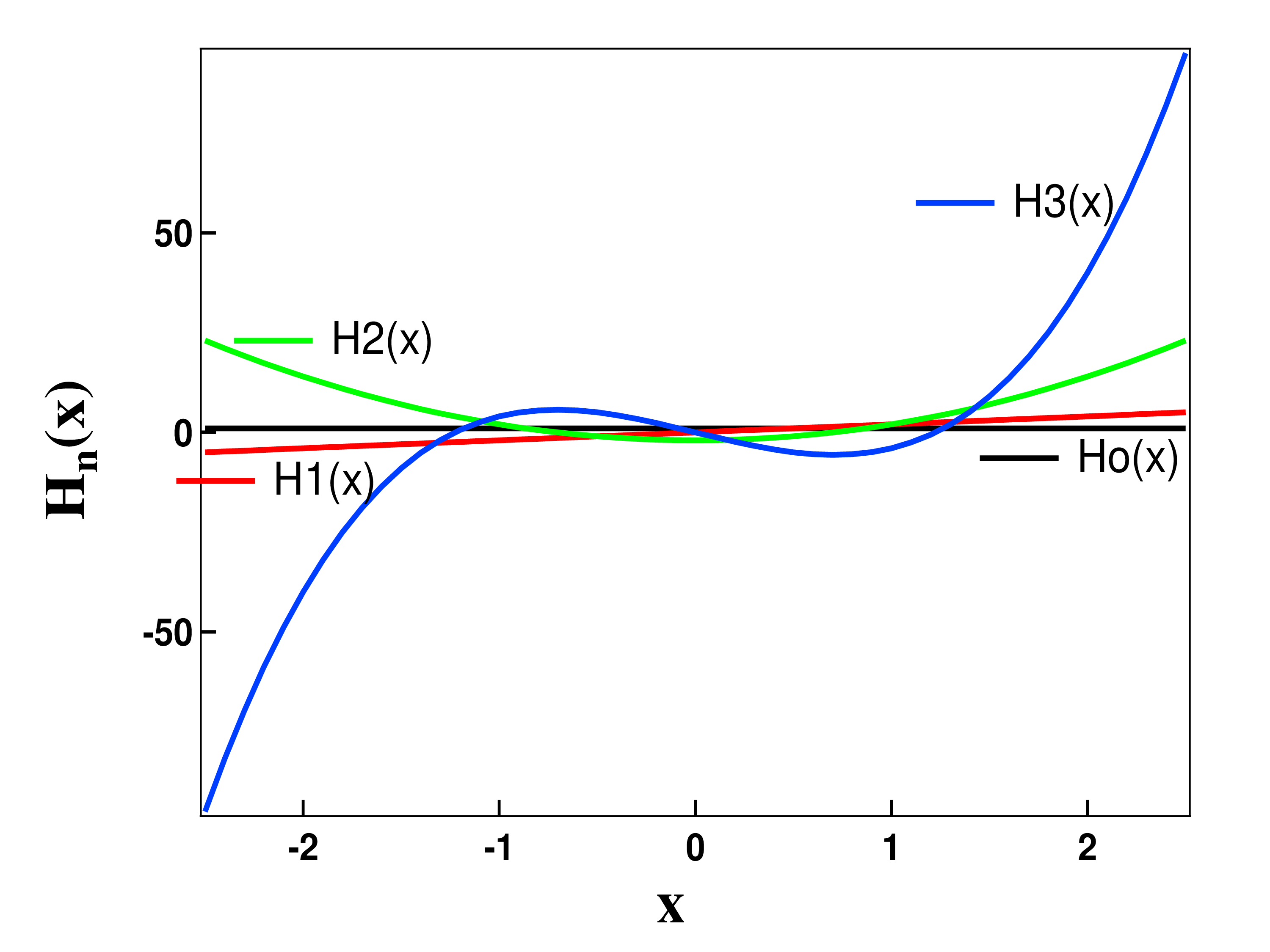If we choose
\(a_{o}=(-1)^{\frac{n}{2}}\frac{n!}{\frac{n}{2}!}\) and
\(\lambda=n\) is an even integer then the series
(4.9.10) is terminating which gives the even polynomial, known as Hermite Polynomial,
\(H_{n}(x) \text{.}\) The term containing
\(x^{n} \) in equation
(4.9.10) is
\begin{equation*}
(-1)^{\frac{n}{2}}\frac{n!}{\frac{n}{2}!} (-2)^{\frac{n}{2}}\frac{n(n-2)\cdots(n-n+2)}{n!}x^{n}
\end{equation*}
\begin{equation*}
=(-1)^{\frac{n}{2}}\frac{n!}{\frac{n}{2}!} (-1)^{\frac{n}{2}}(2)^{\frac{n}{2}}\frac{\frac{n}{2}(\frac{n}{2}-2)\cdots1}{n!}2^{\frac{n}{2}}x^{n}
\end{equation*}
\begin{equation*}
=(-1)^{n}2^{n}\frac{(\frac{n}{2})!}{(\frac{n}{2})!}x^{n}=(2x)^{n}.
\end{equation*}
The term containing \(x^{n-2}\) is
\begin{equation*}
(-1)^{\frac{n}{2}}\frac{n!}{\frac{n}{2}!} (-2)^{\frac{n-2}{2}}\frac{n(n-2)\cdots(n-n+4)}{(n-2)!}x^{n-2}
\end{equation*}
\begin{equation*}
= (-1)^{\frac{n}{2}} \frac{n(n-1)!(n-2)}{\frac{n}{2}!} (-1)^{\frac{n}{2}} (2)^{\frac{n-2}{2}}
\end{equation*}
\begin{equation*}
\times (-1)^{-1}\frac{\frac{n}{2}(\frac{n}{2}-2)\cdots2\cdot1}{1!(n-2)!}2^{\frac{n}{2}}(2)^{\frac{n-2}{2}}x^{n-2}
\end{equation*}
\begin{equation*}
=-\frac{n(n-1)}{1!} 2^{n-2}x^{n-2}=-\frac{n(n-1)}{1!}(2x)^{n-2}
\end{equation*}
and so on. Therefore, the Hermite Polynomial \(H_{n}(x)\) is defined as
\begin{equation*}
H_{n}(x)=\left[(2x)^{n}-\frac{n(n-1)}{1!}(2x)^{n-2}+\frac{n(n-1)(n-2)(n-3)}{2!}(2x)^{n-4} \right.
\end{equation*}
\begin{equation*}
\left.+\cdots+(-1)^{r}\frac{n(n-1)(n-2)\cdots(n-2r+1)}{r!}(2x)^{n-2r}\right.
\end{equation*}
\begin{equation}
\left. +\cdots+(-1)^{r}\frac{n!}{(\frac{n}{2})!}\right]\tag{4.9.12}
\end{equation}
Similarly, equation
(4.9.9) reduces to a polynomial if
\(\lambda=m \) is an odd integer. Let’s choose
\begin{equation*}
a_{o}=(-1)^{\frac{m-1}{2}}\frac{(m+1)!}{(\frac{m+1}{2})!},
\end{equation*}
then the term containing
\(x^{m}\) in the equation
(4.9.9) is
\begin{equation*}
(-1)^{\frac{m-1}{2}}\frac{(m+1)!}{(\frac{m+1}{2})!}(-2)^{\frac{m-1}{2}}\frac{(m-1)(m-3)\cdots(m-m+1+1)}{m!}x^{m}
\end{equation*}
\([\because m=2r+1]\)
\begin{equation*}
=(-1)^{m-1}(2)^{\frac{m-1}{2}}\frac{(m+1)(m-1)(m-3)\cdots2}{(\frac{m+1}{2})!}x^{m}
\end{equation*}
\begin{equation*}
=2^{(\frac{m-1}{2})}\frac{(\frac{m+1}{2})(\frac{m-1}{2})\cdots1}{(\frac{m+1}{2})!}2^{(\frac{m+1}{2})}x^{m}
\end{equation*}
\begin{equation*}
=2^{m}x^{m}=(2x)^{m}
\end{equation*}
and so on. Hence, we have the Hermite polynomia for odd integer is
\begin{equation*}
H_{m}(x)=\left[(2x)^{m}-\frac{m(m-1)}{1!}(2x)^{m-2}+\cdots\right.
\end{equation*}
\begin{equation*}
\left.+(-1)^{r}\frac{m(m-1)\cdots(m-2r+1)}{r!}(2x)^{m-2r}+\cdots\right.
\end{equation*}
\begin{equation}
\left.+(-1)^{(\frac{m-1}{2})}\frac{(m+1)!}{(\frac{m+1}{2})!}x\right]\tag{4.9.13}
\end{equation}
\begin{equation*}
H_{n}(0)=(-1)^{n}\frac{n!}{(\frac{n}{2})!}
\end{equation*}
where \(n\) is even and \(H_{m}(0)\) where \(m\) is odd. For particulars, we have
\begin{equation*}
H_{o}(x)=1, \quad H_{1}(x)=2x,\quad H_{2}(x)=4x^{2}-2, \quad H_{3}(x)=8x^{3}-12,
\end{equation*}
\begin{equation*}
H_{4}(x)=16x^{4}-48x^{2}+12,
\end{equation*}
and so on. In general
\begin{equation*}
H_{n}(x)=\sum\limits_{r=0}^{N}(-1)^{r}\frac{n!}{r!(n-2r)!}(2x)^{n-2r}
\end{equation*}
where
\begin{equation*}
N=\begin{cases}
\frac{n}{2}, & \text{if n is even}\\
\frac{n-1}{2}, & \text{if n is odd}.
\end{cases}
\end{equation*}
The graph of these functions is shown in figure
Figure 4.9.1.

